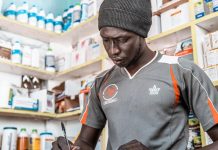Africa-Press – Botswana. Her daily routine starts with a short prayer to request divine guidance in the unpredictable world of the unknown she is about to venture into. As a native of the Okavango, specifically from Jao Flats, Ms Dikeledi Manyima’s survival revolves around the wooden canoe, known as mokoro.
To her, driving mokoro comes naturally since she has been doing it from a young age. Consequently, her face lit up when she formed part of the group invited to share skills with Moshupa residents during the inaugural Hika La Ngwanyana Cultural festival. “For us, this has always been part of our lives because it is our main mode of transport.
We use mokoro to traverse the water bodies to harvest water reed or just to cross the rivers transporting things on daily basis,” she said.
Ms Manyima is one of the people who use their culture and indigenous knowledge for income generation. She has travelled across the country in tourist areas, showcasing her skill and transporting tourists on their holiday excursions through waters infested with dangerous creatures like crocodiles and hippos.
She was delighted to be one of the people launching the virgin waters of Moshupa Dam, using her experience to accelerate economic development in transforming the area into an economic hub for the local communities.
However, she was quick to emphasise the importance of understanding the water body beforehand, to avoid being attacked by dangerous creatures or potentially drowning.
According to her, the first rule would be understanding how to balance mokoro, as well as the perfect way to use the nkashi for pedalling. For first timers, she says it is advisable not to look inside the water to avoid being dizzy and possibly losing balance.
“The secret to balancing is crossing your legs as soon as you enter, take nkashi and keep poking inside to make the mokoro straight and settled before starting your journey.
For someone who is afraid of water, the best way is to focus on where you are going and not look down,” she explained.
Being able to detect and observe the movement of dangerous animals that live in the water also forms part of the indigenous knowledge.
The operator should not only be able to determine the depth of the water, using the nkashi stick, but should also harmoniously exist with the water animals, through understanding their behaviours, signals and movements in the water. Contrary to popular opinion, she believes that women are equally capable of venturing into the business since they also possess similar skills and knowledge.
Subsequently, she was keen to teach women within Bakgatla communities how to operate mokoro, to empower them for opportunities that would arise from the dam activities. Nonetheless, she warned that culturally there were norms and customs that had to be followed for the journey to be smooth.
“For example, one is not supposed to eat leftover millet or certain types of fish, the belief is that they bring bad luck and increase your chances of being attacked by crocodiles or hippos,” she warned.
Her counterpart from Eretsha, Mr Gobusamang Motlalaselelo says knowledge sharing between local communities would improve the tourism sector in the country, with more Batswana being exposed to exciting activities such as mokoro rides. “I have been doing this for a long time and most of our clients are international tourists.
Sharing these skills with other tribes across the country would bring such activities to other Batswana in different parts of the country,” he said. In an endeavour to align their business with sustainable developments that are aligned with saving the planet, they are gradually embracing the use of fibre glass as an alternative to wood canoes.
“We have started using fibre glass because we are also striving to save the trees that we use for curving mekoro. So far, the material works fine and we have not noticed any major changes.”
For More News And Analysis About Botswana Follow Africa-Press






